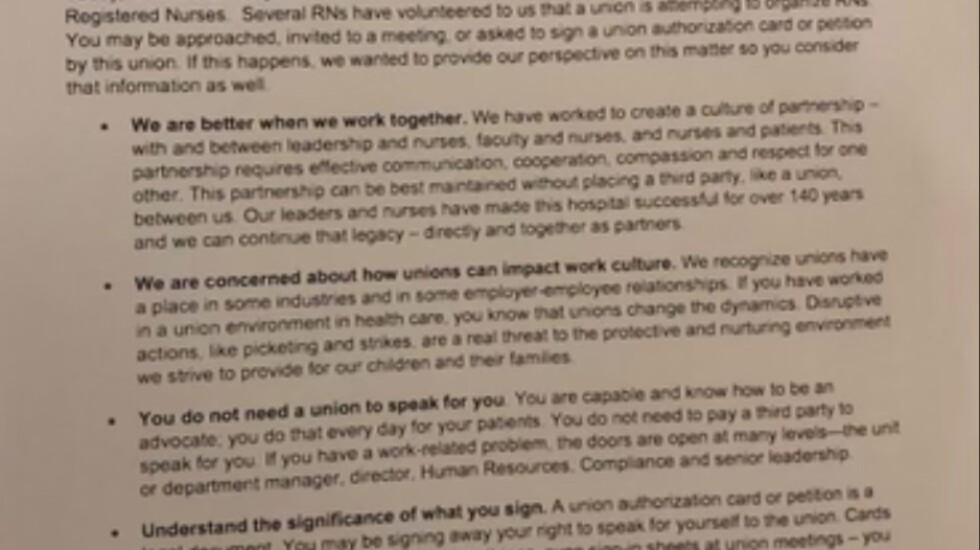
Nurses at one of Chicago’s most prestigious hospitals are at odds with management after receiving what some described as anti-union messaging.
Leaders of Ann and Robert H. Lurie Children’s Hospital of Chicago told nurses they “don’t need a union” to speak for them and that hospital administration is “concerned about how unions can impact work culture,” according to a letter signed by the hospital’s chief nursing officer and assistant chief nursing officer that was obtained by the Chicago Sun-Times.
The letter, dated November 9, follows a tumultuous few years at Lurie and hospitals across the country as the COVID-19 pandemic tested the health care system. Staffing shortages, higher-than-normal patient-to-nurse ratios and burnout became common, nurses told the Sun-Times.

“You feel as if you’re a bad nurse because you are limited in the time you can spend with each of your patients,” said a Lurie nurse who has worked at the hospital for more than 16 years and asked not to be named publicly. “Lurie nurses strive to give the best care we can give, and that really hits us at our heart when we feel like we can’t give that.”
A spokesperson for Lurie said the hospital “respects the right” of employees to organize but said unionization can have a “profound impact” on the work environment.
“Like most pediatric healthcare organizations, Lurie Children’s has faced challenges that have made nursing harder, but we remain committed to working directly with our workforce to address concerns and to continue to foster a culture built on mutual respect and shared dedication to providing a healthier future for every child,” spokesperson Julianne Bardele wrote in an email to the Sun-Times.
Bardele didn’t answer specific questions about the situation, including how hospital leadership will address nurses’ concerns if they don’t unionize.
When attempting to discuss staffing issues and improving work conditions, managers and directors disregarded the concerns, prompting conversations among staff about the possibility of unionizing, two nurses said.
“Every month we will sit down and go through issues,” said a Lurie nurse of six years who asked not to be publicly identified. “I brought up some issues that I was concerned about and my director was … I wouldn’t say yelling, but she got very short with me.”
The nurses described feeling disheartened and “threatened” by senior leadership after receiving the letter and said they wished it would have included possible compromises.
“[Some of the phrases used in the letter] really made us feel little because many of us have spoken and continue to speak and have gone those routes and avenues that they talked about in that letter and then it’s crickets afterwards,” the 16-year Lurie veteran said.
The circumstances come amid a surge of labor activism nationwide. Workers at corporations including Starbucks and Amazon have begun organizing, and more than 15,000 nurses in Minnesota went on strike for three days in September.
While she wouldn’t comment on the specific situation at Lurie or the contents of the letter from management, spokesperson for National Nurses United Rachel Berger said unionization could improve wages, equity, job security and safety.
“Importantly, analyzing union versus nonunion wages alone likely grossly underestimates the material benefit that union nurses can win through collective bargaining,” Berger said in an email.
The nurses who spoke with the Sun-Times wouldn’t go into detail about what could come next for nurses at Lurie but said discussions are ongoing.







